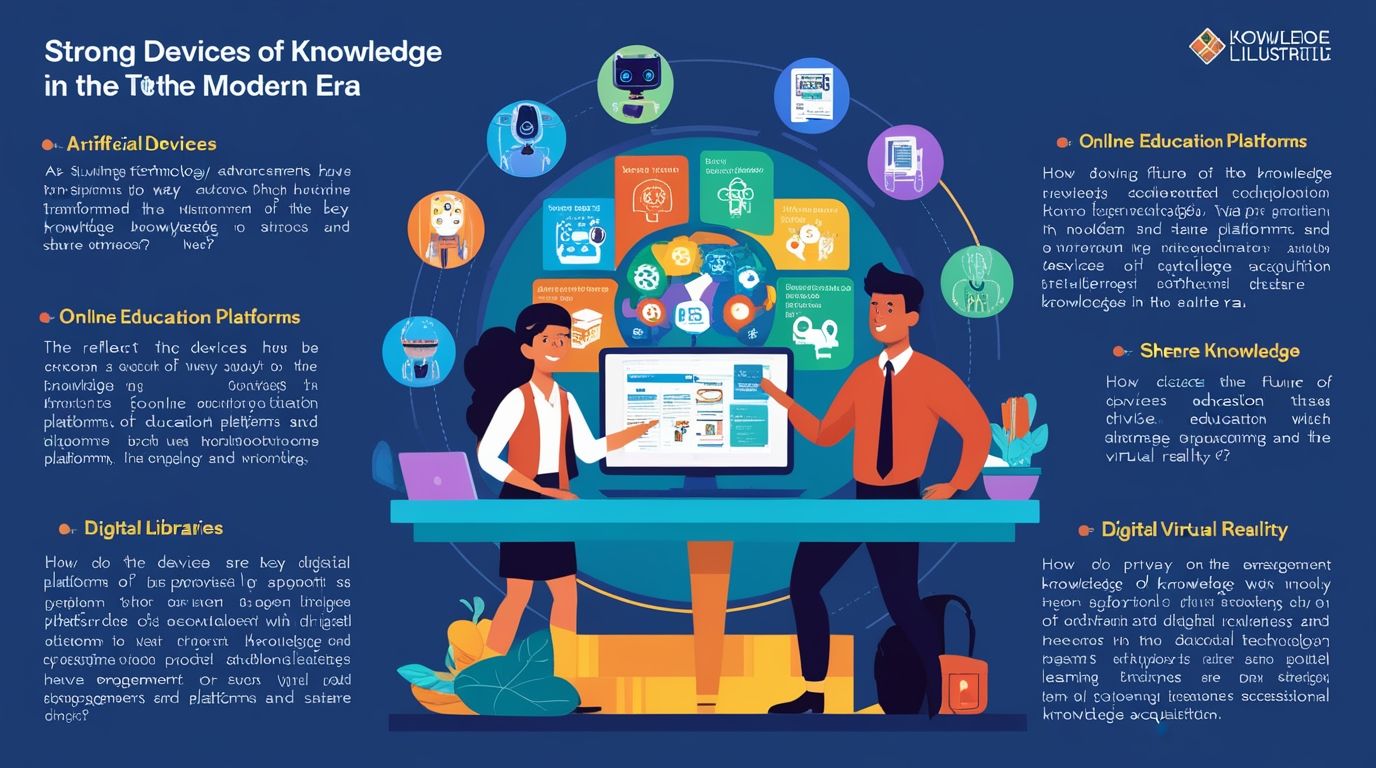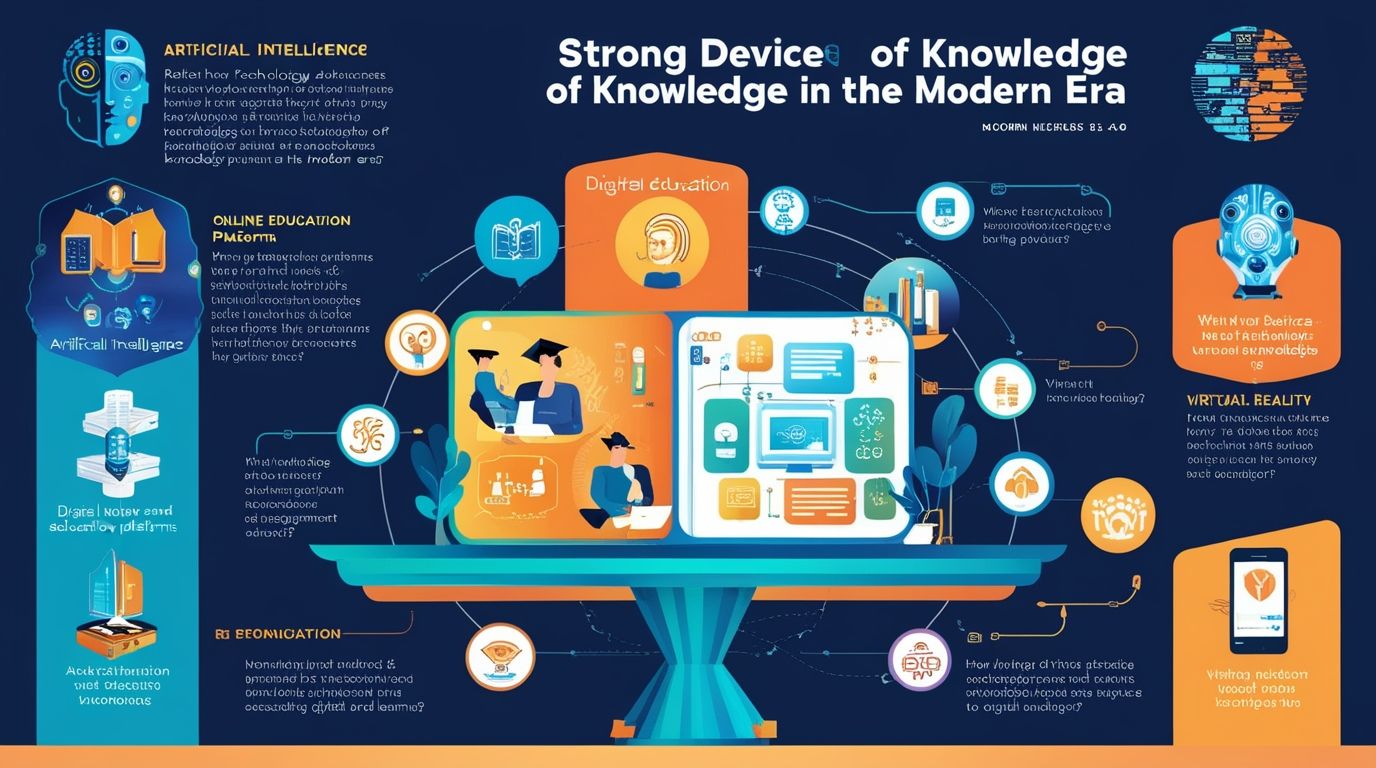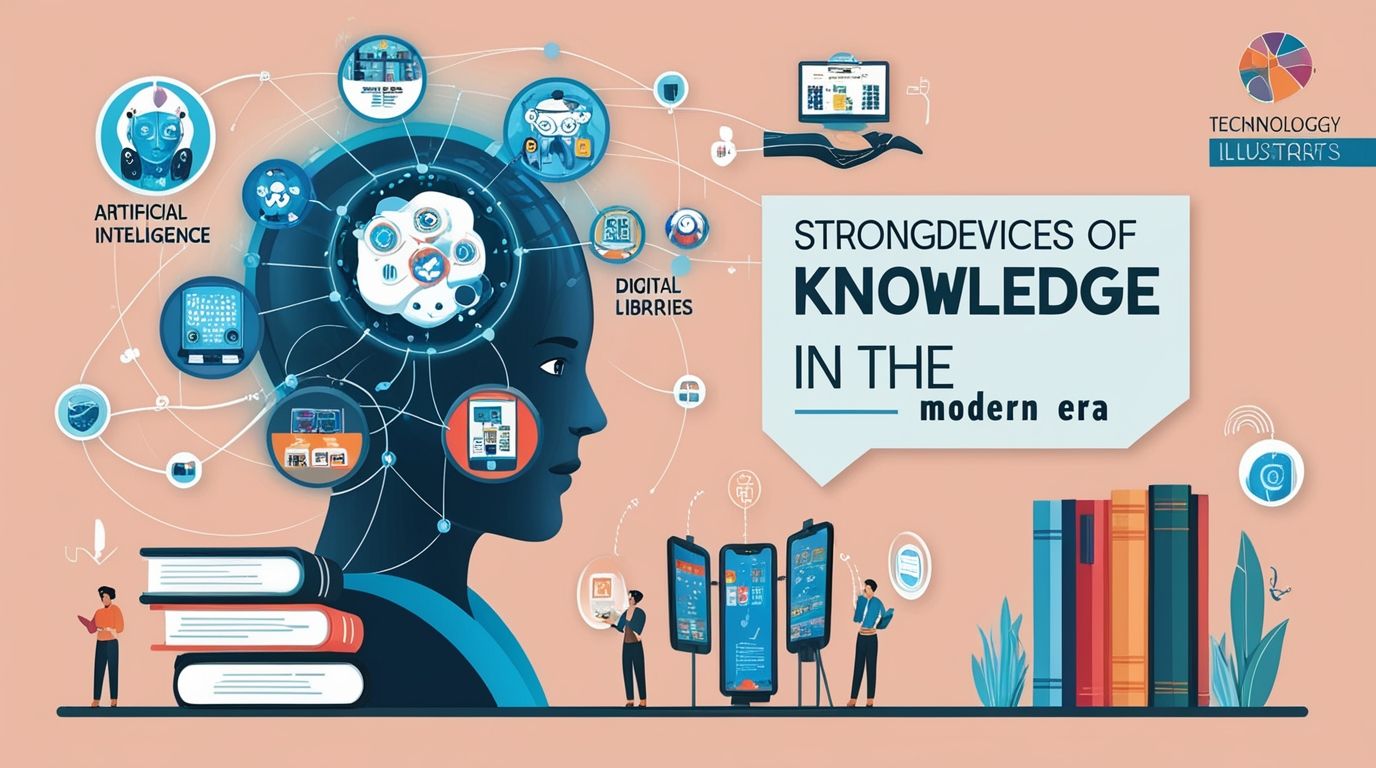Strong Devices of Knowledge in the Modern Era or in the contemporary world, the quest for knowledge has profoundly transformed by technological advancements. The proliferation of digital tools and platforms has democratized access to information, fostering an environment where learning is more accessible, engaging, and effective. These strong devices of knowledge—spanning from artificial intelligence to online education platforms—serve as powerful catalysts for an enlightened society. This article explores the significance, impact, and future prospects of these knowledge-enhancing tools in the modern era.
The Evolution of Knowledge Acquisition
Strong Devices of Knowledge in the Modern Era or the methods by which we acquire knowledge have evolved significantly over time. Traditional means of education, such as books, lectures, and physical libraries, have been supplemented—and in some cases, supplanted—by digital innovations. This shift has not only expanded the reach of educational resources but also enhanced the ways in which knowledge delivered and absorbed.
Key Devices and Platforms
- Artificial Intelligence (AI) and Machine Learning (ML): AI and ML have revolutionized the way we process and interact with information. These technologies enable personalized learning experiences, where algorithms can adapt educational content to suit individual learning styles and paces. For instance, platforms like Duolingo use AI to provide customized language learning paths, while tools like Grammarly leverage ML to offer real-time writing assistance and feedback.
- Online Education Platforms: Massive Open Online Courses (MOOCs) such as Coursera, edX, and Khan Academy have democratized access to quality education. These platforms offer courses from renowned universities and institutions, making high-caliber education accessible to anyone with an internet connection. The flexibility of online learning allows individuals to pursue education at their own pace and on their own schedule, breaking down barriers related to geography and time.
- Digital Libraries and Archives: Digital libraries like Google Books, Project Gutenberg, and JSTOR provide unprecedented access to a vast array of texts and academic papers. These resources invaluable for researchers, students, and lifelong learners, offering a wealth of information that previously confined to physical locations.
- Collaborative Tools: Platforms like Google Workspace and Microsoft Teams facilitate real-time collaboration and knowledge sharing. These tools are essential for both academic and professional settings, enabling seamless communication and collaborative problem-solving regardless of physical location.
- Virtual and Augmented Reality (VR/AR): VR and AR technologies are transforming the educational landscape by providing immersive learning experiences. For example, medical students can practice surgeries in a virtual environment, while history students can explore ancient civilizations through augmented reality simulations. These technologies make learning more interactive and engaging, enhancing retention and understanding.

Impact on Education and Society
The integration of these devices and platforms into the educational framework has far-reaching implications:
- Increased Accessibility: Digital tools break down barriers to education, making learning opportunities available to a broader audience. This is particularly significant for individuals in remote or underserved areas who may lack access to traditional educational institutions.
- Personalized Learning: AI-driven personalization allows for tailored educational experiences that cater to individual needs and preferences. This approach helps students grasp concepts more effectively and fosters a more inclusive learning environment.
- Lifelong Learning: The availability of online courses and digital resources supports lifelong learning, enabling individuals to continually update their skills and knowledge. This is crucial in an era characterized by rapid technological advancements and shifting job markets.
- Collaborative Learning: Collaborative tools promote teamwork and collective problem-solving, skills that are essential in the modern workforce. These platforms also facilitate the sharing of diverse perspectives, enriching the learning experience.
- Enhanced Engagement: Interactive technologies like VR and AR make learning more engaging and enjoyable. By simulating real-world scenarios, these tools help students apply theoretical knowledge in practical contexts.
Challenges and Considerations
Strong Devices of Knowledge in the Modern Era , Despite the numerous benefits, the integration of strong devices of knowledge into education is not without challenges:
- Digital Divide: Access to technology remains uneven, with significant disparities between different regions and socioeconomic groups. Bridging this digital divide is essential to ensure equitable access to educational resources.
- Privacy and Security: The use of digital platforms raises concerns about data privacy and security. Protecting sensitive information and ensuring that platforms adhere to stringent security standards is paramount.
- Quality Control: The proliferation of online content necessitates mechanisms to ensure the quality and accuracy of information. Users must be able to distinguish between credible sources and misinformation.
- Dependency on Technology: Overreliance on digital tools can lead to a diminished capacity for critical thinking and problem-solving without technological assistance. Balancing the use of technology with traditional methods is crucial.
- Teacher Training: Educators need to adequately trained to effectively integrate technology into their teaching practices. Continuous professional development is necessary to keep pace with technological advancements.

Future Prospects
The future of knowledge acquisition is poised to be even more dynamic and interconnected. Emerging technologies like quantum computing, advanced AI, and the Internet of Things (IoT) will further revolutionize how we access and interact with information. The integration of these technologies will likely lead to more sophisticated personalized learning systems. Enhanced virtual collaboration, and new forms of immersive educational experiences.
Moreover, as global connectivity improves, we can expect a more interconnected educational ecosystem. Cross-cultural collaborations and global learning communities will become more prevalent, fostering a more inclusive and diverse exchange of knowledge.
Conclusion
In the modern era, strong devices of knowledge have become indispensable tools for fostering an enlightened and informed society. By enhancing accessibility, personalization, engagement, and collaboration, these technologies are transforming the educational landscape. However, it is essential to address the challenges associated with digital integration to ensure that the benefits of these advancements are realized equitably.
As we look to the future, the continued evolution of these devices promises to unlock new possibilities for knowledge acquisition and dissemination. Embracing these innovations while remaining mindful of the associated challenges will be key to harnessing their full potential. And fostering a more educated and enlightened global community.

231v3n
3z8zz9
uowjbd
I do not even know how I ended up here, however I believed this post used to be good. I don’t recognise who you are but definitely you’re going to a well-known blogger in the event you aren’t already 😉 Cheers!
Temukan peluang menang besar di Shark Bounty : Slot Online Gacor yang Menjanjikan
hello there and thank you in your info – I have definitely picked up something new from proper here. I did however expertise several technical points the use of this site, as I experienced to reload the site many instances prior to I may just get it to load correctly. I were brooding about if your web host is OK? Not that I am complaining, however slow loading circumstances instances will sometimes impact your placement in google and can damage your high-quality score if advertising and ***********|advertising|advertising|advertising and *********** with Adwords. Well I am including this RSS to my e-mail and could look out for much extra of your respective fascinating content. Make sure you replace this once more soon..
a4k1vd
Fantastic goods from you, man. I have understand your stuff previous to and you’re just too great. I actually like what you have acquired here, certainly like what you are saying and the way in which you say it. You make it entertaining and you still care for to keep it sensible. I cant wait to read much more from you. This is really a tremendous website.
Really instructive and great structure of written content, now that’s user pleasant (:.
WONDERFUL Post.thanks for share..more wait .. …
Undeniably imagine that that you stated. Your favourite justification seemed to be on the net the easiest factor to consider of. I say to you, I certainly get annoyed whilst folks think about issues that they plainly do not understand about. You controlled to hit the nail upon the highest and also defined out the entire thing without having side effect , other people could take a signal. Will likely be again to get more. Thank you
Heya i am for the primary time here. I came across this board and I to find It really helpful & it helped me out a lot. I hope to present one thing again and help others like you aided me.
Thanx for the effort, keep up the good work Great work, I am going to start a small Blog Engine course work using your site I hope you enjoy blogging with the popular BlogEngine.net.Thethoughts you express are really awesome. Hope you will right some more posts.
Greetings! Very helpful advice on this article! It is the little changes that make the biggest changes. Thanks a lot for sharing!
Hi! I’ve been following your blog for a while now and finally got the courage to go ahead and give you a shout out from Kingwood Tx! Just wanted to mention keep up the fantastic job!
of course like your website however you need to test the spelling on several of your posts. Many of them are rife with spelling problems and I in finding it very troublesome to inform the truth nevertheless I will definitely come back again.
Hello my friend! I want to say that this article is amazing, nice written and include approximately all significant infos. I’d like to see more posts like this.
Lovely just what I was looking for.Thanks to the author for taking his clock time on this one.
Greetings I am so delighted I found your blog page, I really found you by accident, while I was looking on Bing for something else, Nonetheless I am here now and would just like to say kudos for a incredible post and a all round entertaining blog (I also love the theme/design), I don’t have time to browse it all at the moment but I have bookmarked it and also added your RSS feeds, so when I have time I will be back to read a great deal more, Please do keep up the excellent work.
I was just seeking this info for a while. After 6 hours of continuous Googleing, at last I got it in your website. I wonder what’s the lack of Google strategy that do not rank this kind of informative websites in top of the list. Usually the top websites are full of garbage.